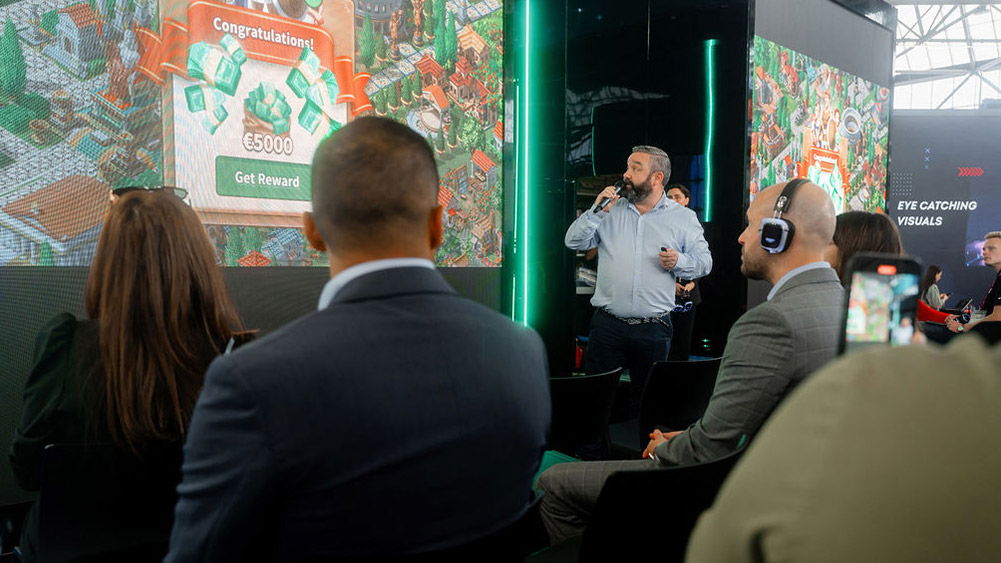iGaming turnkey solutions provider Soft2Bet recently participated in the Canadian Gaming Summit, an event that drew over 3,000 industry professionals from the gambling sector and provided a valuable platform for exploring the evolving landscape of the Canadian sector.
Yogonet spoke with Martin Collins, Chief Business Development Officer at Soft2Bet, to delve into the key takeaways from the event and to discuss the future trajectory of the market.
During the conversation, Collins shared the challenges and opportunities presented by Ontario’s regulatory environment, which has influenced business costs and market dynamics. He also touched on the potential for the province of Alberta to emerge as a new player in the gaming sector, noting how the province’s anticipated regulatory framework could shape the industry’s growth.
Soft2Bet recently participated in the Canadian Gaming Summit, which brought together over 3,000 delegates from gaming and sports betting companies. What are your main takeaways from this event and, based on your participation, where do you see the Canadian market headed?
The Canadian Gaming Summit, though small and intimate, attracts high-quality delegates, each with specific goals in mind. This focused environment makes it easy to connect with the right people and clearly define objectives.
Ontario has adopted several key practices from various US states, leading to high business costs. The elevated CPA and Revshare expenses, along with stringent bonus and promotion requirements for retention, have resulted in low ROI, causing some operators to exit the market. However, customer value remains high, and effective retention strategies can significantly boost ROI.
Additionally, there was considerable discussion about Alberta potentially being the next province in Canada to regulate gaming. The anticipated framework is expected to be similar to Ontario’s, reducing regulatory and technical burdens for operators. This familiar structure should expand the overall market size.
During a panel discussion at the summit, you highlighted the importance of omnichannel in gaming. Could you elaborate on Soft2Bet’s approach to integrating these strategies and how they contribute to both player retention and operational efficiency?
As the gambling industry shifts from retail to online due to increased regulatory measures, brand equity becomes crucial. While retail establishments excel in brand equity, their audience is predominantly centered around physical casinos. As this transition progresses, it is essential for entertainment-focused brands to cater to both their traditional customers and the new generation preferring online experiences.
Additionally, some customers may engage with both platforms, enhancing touchpoints, data collection, and the ability to create tailored user journeys across both channels.
At Soft2Bet, data drives all our decisions, shaping customer experiences that foster loyalty and engagement. This data-centric approach has been fundamental to our business since day one. With our unique perspective, we can add value to any land-based establishment, guiding them to build relevant and valuable omnichannel experiences.

You have called the shift to omnichannel experiences “not just a trend but a necessary evolution for land-based casinos.” In your opinion, have brick-and-mortar properties already recognized the importance of omnichannel? What are some major opportunities and obstacles they might face in this conversion?
It’s unfair to suggest that brick-and-mortar properties have not embraced omnichannel strategies. Although it is still early in this journey, many have been pioneers in implementing omnichannel initiatives, especially around registration, wallet integration, and loyalty programs.
These efforts, though sometimes workaround solutions, have effectively driven engagement. Caesars’ loyalty program is a standout example. As omnichannel strategies are still in their infancy, it will take time to fully develop and roll out. Those who adopt these approaches early are likely to reap the greatest benefits.
Soft2Bet has been presenting its Motivational Engineering Gaming Application (MEGA) at the latest shows it has attended. Were Canadian attendees also interested in leveraging this solution? And returning to the topic of omnichannel integration, can MEGA help traditional casinos who are seeking to modernize their operations?
MEGA can be central to any regulated jurisdiction’s strategy. We understand that costs are high and achieving ROI can be challenging, especially when trying to establish a position and gain market share. However, MEGA can address these issues by leveraging mechanics from other industries to elevate your gamification efforts, driving engagement and loyalty while attracting a new customer base.
Given this, many operators in Ontario are keen to consider MEGA, and we continue to engage in extensive discussions about integrating our unique solution. For retail establishments with an established customer base, we can create bespoke gamified experiences tailored to your audience. These experiences will resonate and be relevant, enhancing engagement and improving ROI from your investments.
Soft2Bet’s expansion plans in North America include Ontario in Canada and New Jersey in the US. With the recent acquisition of an Ontario license, what’s the next step for Soft2Bet in the Canadian province? And with Alberta’s announcement at the show of a plan to open a regulated market, is this an opportunity Soft2Bet could be seeking to explore?
The suggestion that Alberta will adopt a framework similar to Ontario’s significantly lowers the barrier to entry compared to typical jurisdictional launches, making it an area of keen interest for us. We have a deep understanding of the overall Canadian market and are exceptionally well-positioned to enter any province as they regulate, including Alberta.













